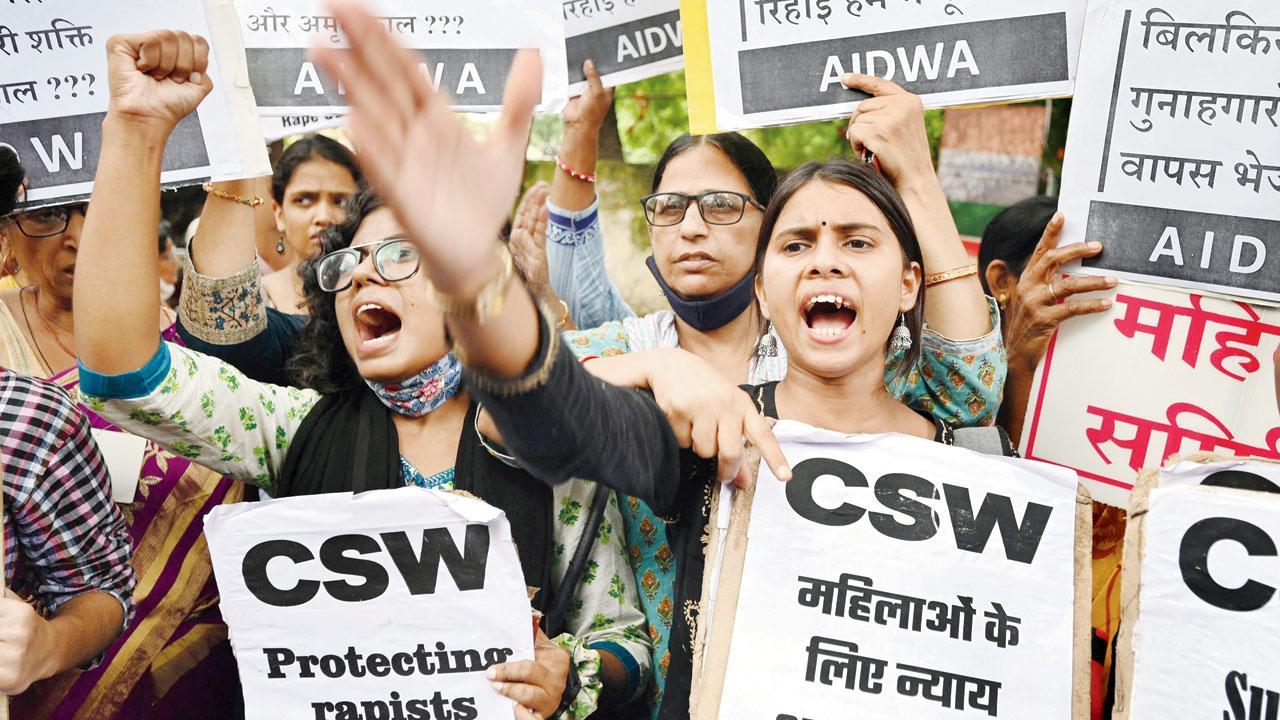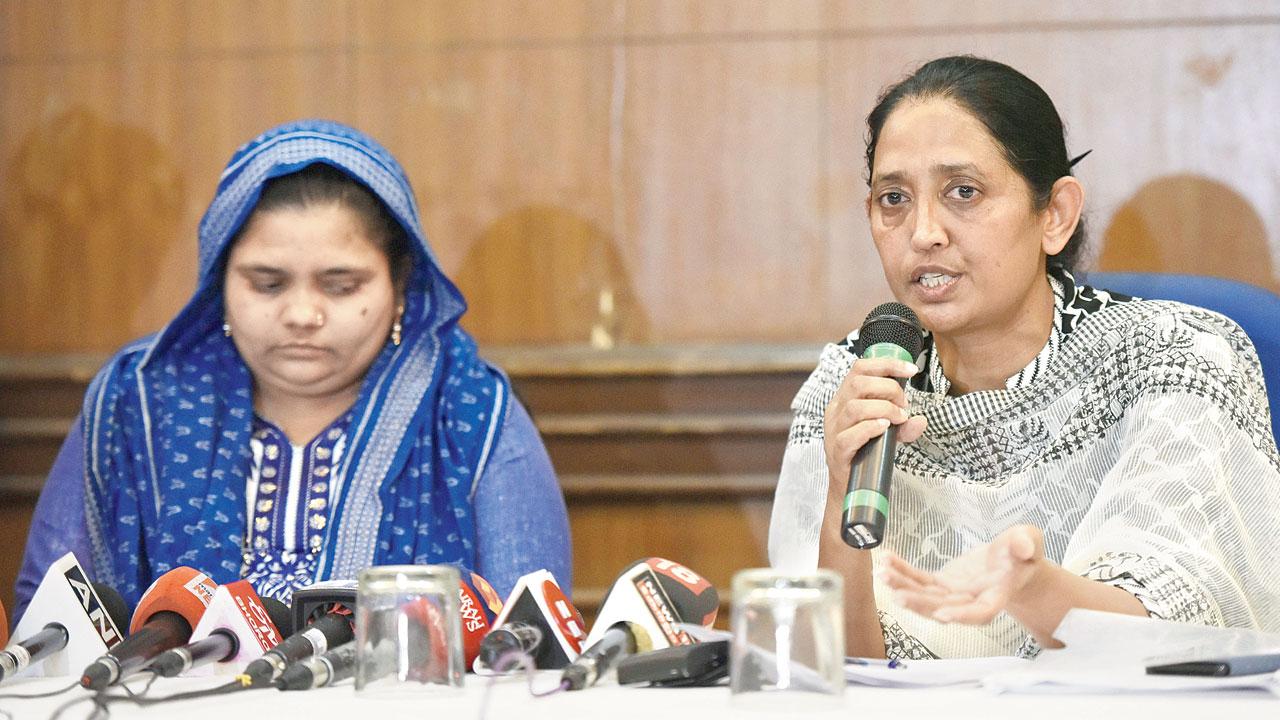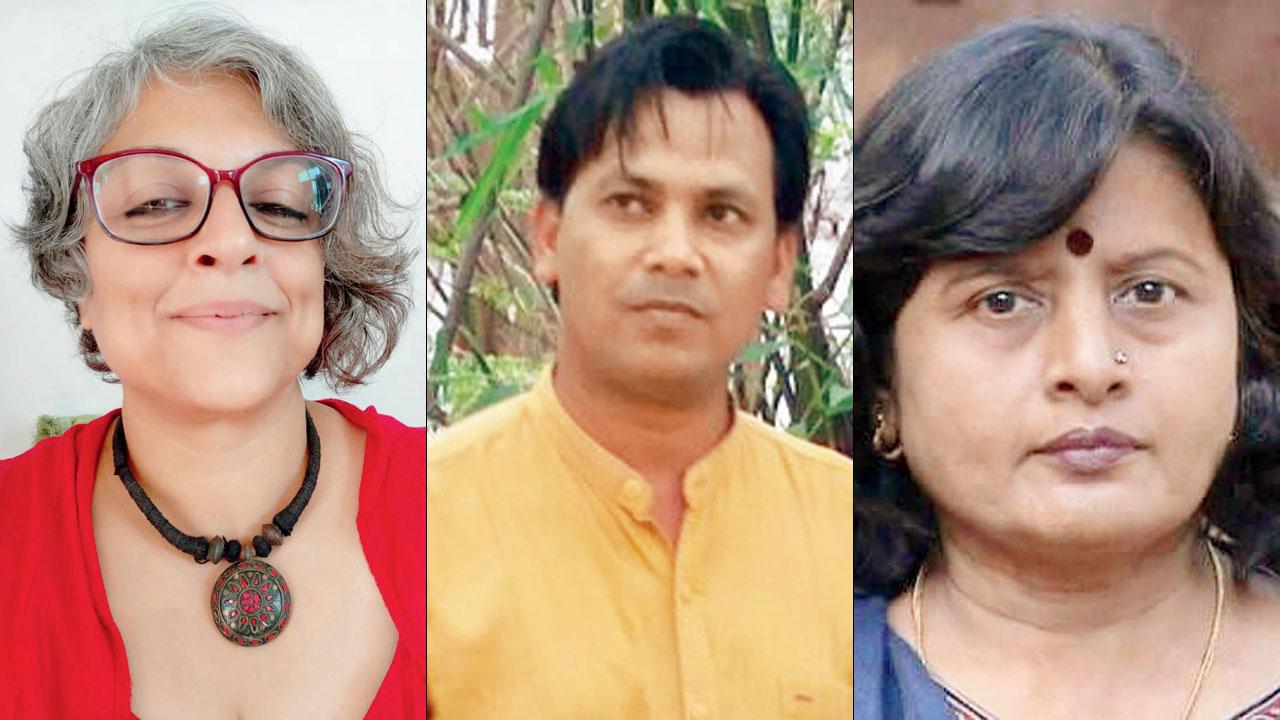After remission of 11 accused convicted in the Bilkis Bano rape and murder case of 2002, her lawyer and activists who fear that it will set a wrong precedent for other criminals, make a plea for justice

Activists shout slogans and hold placards during a protest against the release of the 11 men convicted of gangraping Bilkis Bano in New Delhi. Pic/Getty Images
On August 15, when India was celebrating 75 years of Independence, Bilkis Bano’s world fell apart, once again. Her long-legal battle against the 11 men convicted of gang-raping her, and murdering at least seven members of her family, including her three-year-old daughter in the Gujarat riots of 2002, had come to naught, as they walked out of jail in Godhra. The accused, who had been sentenced to life imprisonment, were released after the state government approved their application for remission of sentence, as part of a special remission policy of 1992, to mark the Azadi Ka Amrit Mahotsav. This, despite the central government, in its June 2022 order instructing all state and UT prisons that the remission policy would not be applicable to convicts of rape.
ADVERTISEMENT
Bano, who is still on anti-depressants, is fearful for her family again, Delhi-based Supreme Court lawyer Shobha Gupta, her advocate in the case since the start, tells mid-day in a phone interview. Gupta, who is also experiencing a fresh toll on her mental and emotional health since the development, has agreed to speak, after several failed attempts. “Honestly, I don’t believe it [remission of 11 convicts] can be treated as a precedent for other rapists and murderers in jail. It is a wrong decision, which cannot be negatively applied or become law of the land.”
Also read: Release of rape convicts has shaken my faith in justice: Bilkis Bano

Bilkis Bano, who is still on anti-depressants, is fearful for her family again, her lawyer Shobha Gupta says
In 2017, the Bombay High Court upheld the conviction of Bano’s criminals with life imprisonment. Two years later, the apex court directed the state government to allocate her a house, provide her a job and compensate her with Rs 50 lakh, the highest compensation paid to a rape survivor in India till now. It appeared at least then that Bano, a mum of five, could now rest easy. Justice had been served, or so her lawyer Gupta thought.
Gupta was going about her daily court schedule when Bano’s husband Yakub Rasul called her on August 14. The call was not out of the blue as the family continued to stay in touch with her. Gupta was also hoping to help Bano’s eldest daughter pursue her legal dreams. “He frantically called asking if there was any order for the convicts’ release. I checked up and nonchalantly informed him there was nothing, and that he should relax,” Gupta recalls. “Yakub called the second time confirming the news. He told me that celebrations had begun.” Bano had not even been provided police security.
That they were accorded a life sentence in the case, Gupta feels, was clemency enough, even though it wasn’t challenged by them in court. “Ideally we should have, but we didn’t for Bano’s peace of mind. Imagine seeing your family, including your mother and sister, being murdered in front of you, be raped yourself while being five months pregnant, see your three-year-old child smashed dead to a rock, have not a strip of cloth on you in the dead of the night and sit among all bodies until sunrise. We wanted this to finally end for Bano,” she shares.
Advocate on record for Gopinath Pillai, who was killed with Ishrat Jahan in the alleged fake encounter case in 2004, Gujarat-based Shamshad Pathan asks a pertinent question. “Aren’t there other prisoners in Gujarat who have served decades of their sentence? Why was remission not given to them, but given to convicts of a heinous crime towards society?” Pathan believes the socio-political fabric of Gujarat has been broken down systematically over the course of two decades, and the remission will only boost the confidence of other rapists and murderers.

Revati Laul, Shamshad Pathan and Nirjhari Sinha
Bano’s pain was not hers alone. Gupta suffered for nights too. “Such cases hound you. As lawyers, we read detailed descriptions and witness accounts of cases, which don’t often leave us, even if we move past them in conscious everyday life. I wasn’t able to sleep for nights on end after knowing about Bano and going into the details.”
Gupta feels widespread support poured for Bano and the courts worked on her case sincerely. But not every rape survivor gets that kind of attention. “Another survivor who is pursuing her case, which is yet to be charge-sheeted, called me up after this remission. She wanted to drop out completely. She felt if Bano’s case even with support and interventions could see such a fate, what would become of hers?”
Pathan also claims that the remission policy of 2014 should have been applied in this case, nor that of 1992. “When a criminal completes a sentence, remission is decided upon the policy in existence at that time, not one in retrospect. This is a technical anomaly. The 2014 remission policy does not allow for rapists and murderers to be released.”
Independent journalist and activist, Revati Laul, who wrote the book, The Anatomy of Hate, on the lives of Godhra rioters, is also dejected with the remission. “Over and above the takeaways other criminals get from this, more worrisome is what this means for our democracy and for us as a nation.” Laul cannot fathom why there is no upheaval from the Opposition. “Sad that the executive is shadowing the judiciary.”
But Gupta doesn’t want to blame the government for the committee’s decision. She gives them the benefit of the doubt, and believes that the three stakeholders in the case—the Gujarat state government, the central government or the investigating agency CBI—will interject one of these days. She is also pinning her hopes on the courts taking suo-motu cognisance of the case. Until then, she has no future plan. “With folded hands I urge all these stakeholders to have mercy on Bano. Tell her you support her. Tell people that it is not always them who have to run for justice, it can come to them too. This should be a larger message than the wrong message going out to society now.”
Activist Nirjhari Sinha, whose late husband advocate Mukul Sinha fought for the victims of the Naroda Patiya massacre, leading to conviction of 32 accused, is blatant about her reservations on the remission, given the nature of the crime. “Theirs was a proven crime. The celebrations that happened are deplorable. There was no guilt or remorse. They didn’t win a war. Previously there were reports of them having threatened Bano and we don’t know what they might do now.” She says the committee should have been “fair and independent of government control”.
On the legal front, there was no notice to Bano or to her lawyer about the entire procedure. “There had to be a notice,” says Gupta, explaining, “Legally, it is mandatory for the committee examining remission, to look into safety aspects of the survivor. You cannot do that without asking the victim, who in this case was kept out of the process.”
Pathan says we shouldn’t look at “Bano’s case as that of a minority woman’s fight”. “This is about all citizens, the society and justice. Why not look at Bano just as a victimised woman seeking truth?”
 Subscribe today by clicking the link and stay updated with the latest news!" Click here!
Subscribe today by clicking the link and stay updated with the latest news!" Click here!







